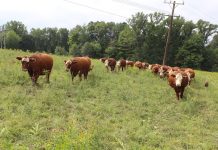I have always been amazed at the bold and inquisitive nature of our ancestors who were willing to set off for sites unseen, leaving behind the only sure thing they’d ever known.
The Diary of Annie Elliott Perrin: Soliloquy of a Farmer’s Wife, edited by her grandson, Dale B.J. Randall, is a treasure of a book, detailing one year in the life of one such brave and interesting woman in 1918.
As Duke professor and author Randall points out, it is amazing that this hard-working woman, as all women seemed to be in those difficult days, ever found the time or energy to jot a note in a journal at the end of a day.
The little diary was a gift to her from her two older children when they learned that their parents and younger brother were going to leave their Geneva, Ohio, farm for a trip to Florida, perhaps to purchase land there.
A day at a time. On Dec. 17, 1917, Annie Elliott Perrin, her husband and son left their Cleveland home to travel by train for Florida. It didn’t take long to see that Annie may almost instantly have regretted the bold adventure.
She writes, Jan. 6, 1918, a Sunday: “This has been a rather lonesome day. I miss being at home. Seems so hot here.”
But the next day, a Monday, she writes, “This is the prettiest morning we have had. Seems like an Ohio May morning.”
The next day she notes, “Everyone seems very friendly here. But the natives are rather distant, I think.”
A day later she notes, “Things are a little pleasanter today. But nothing to brag about.”
A week later, her homesickness seems acute as she writes, “Another day gone. Every day makes one less to be here.”
Homesick. The heat, the bugs, unusual food, the strangers in a strange land all combined to make the hard-working farm woman incredibly homesick and ready to bolt for chilly Ohio.
On March 23, 1918, the diary entry tells of taking a street car and a train for their return to Geneva at 5:10 p.m. “So this ends our trip to Florida and back.”
The next few days are spent hard at work: baking bread, washing, getting the chickens home, getting the pump to work.
“Wish the terrible war over,” is the first reference to World War I in her diary, written on March 26, 1918.
Annie’s oldest son, Henry, would likely have to go to war soon as Germans advanced against British artillery.
The journal entry on March 29 is touching in its simplicity. “Tonight is bright moonlight. So glad to be home.”
Close to home. It was in 1922 that my own great-grandfather decided he wished to travel to Florida. He purchased a new Model T Ford and convinced my grandfather, Raymond Young, who was still single at that time, to drive him there.
In the book compiled by my aunt, Miriam Young Slabaugh, she quotes her father:
“Dad decided that he would like to go to Florida and check into the possibility of buying land for a produce or fruit farm. The warmer weather appealed to him since he could have more than one crop per season. So Dad and left in the new car. We got along pretty good going down. He was disappointed in the farming opportunities so after he did some fishing we headed home.”
The trip home was harrowing, as the brakes went out of the new car coming through hairpin turns in the mountains.
My grandfather’s words echoed Annie Perrin’s as he concluded his story with, “I was sure glad when we got home from that trip.”
Get 4 Weeks of Farm and Dairy Home Delivered












